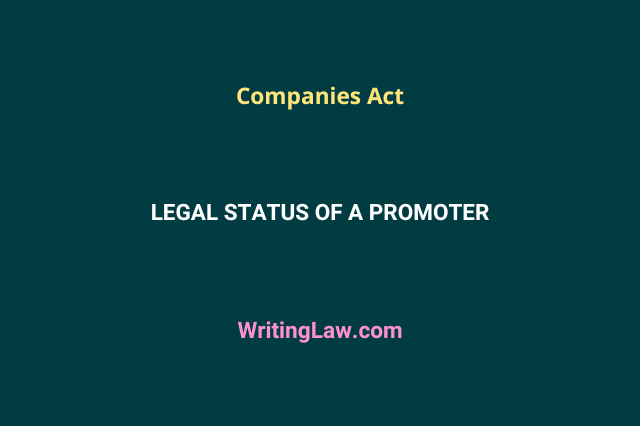
This article provides an overview of the legal status of promoters under the Companies Act of 2013, focusing on their roles, responsibilities, and fiduciary relationship with the company.
Role and Significance of Promoters in Company Formation
In order to establish any company, there should be some individuals present who have the purpose or idea to form a company, who also possess the required resources to carry out that idea, and who strive to do so. They’re known as promoters.
As a result, the promoter is the individual who initiates the development of the whole company and carries out all tasks required for the registration and establishment of a company, such as obtaining subscribers to the memorandum and articles of association, settling the preliminary contract and agreement with the vendors and underwriters, disseminating the prospectus, or hiring specialists like bankers, brokers, legal counsel, first directors, etc.
However, not all professionals, such as accountants or attorneys, who have been hired for their respective jobs on behalf of the promoter will be referred to as promoters.
A company may employ a number of promoters. They could be companies or natural persons. The promoters have no compulsion to play an active role in the formation. A person will still be considered a promoter even if they have had less active involvement.
The role of promoters begins at the very beginning of the company formation and incorporation stage, and the interaction between the promoter and the company begins when the work of establishing the company commences. While it is difficult to describe what a promoter is, the promoter’s legal standing is pretty obvious.
Who Is a Promoter?
The promoter is defined under section 2(69) of the Companies Act, 2013. It refers to a person:
- whose name appears in the prospectus or who has been identified in the annual reports by the company as specified in section 92 of the Companies Act, 2013, or
- who has the authority to direct or otherwise control the management of the company as a shareholder, director, or in any other capacity, or
- who gives advice and instructions to the board of directors, guiding the company’s decisions, but not someone hired by the company for their professional services.
Legal Status of a Promoter
The promoter is elevated to a position of great authority and responsibility. The promoters’ legal position is that they are neither agents nor trustees because the company has not yet been formed. Instead, they are in a fiduciary relationship, which implies they are in a trust-based relationship, and the trust defines their legal standing, which the promoters should not misuse.
As a result of being in a fiduciary relationship, promoters have two key responsibilities:
1. Obligation not to make any hidden profit: A promoter has many benefits since he is the only person in control of forming a company, but this may also lead to a lot of abuse of the powers bestowed upon him. As a result, the promoter is not permitted to profit secretly from any agreements. However, the promoter may do so provided he reveals it to the independent board of directors, the articles of association, the prospectus, or current and prospective shareholders.
2. Obligation to disclose any interest in transactions with the company: In addition to the duty outlined above, the promoter is required to disclose any interest he has in any transactions with the company.
If the foregoing responsibilities are not met, the promoters are breaching their fiduciary duty to the company and abusing their authority. In this case, the company has the option to cancel the contract, recover the secret profit, or sue the promoter.
Promoter duties begin long before the company’s formation, and as a result, the promoter must make several contracts on behalf of the company because it hasn’t yet been formed, and only the promoter can make them. All contracts will have to be authorized and approved by the company when they are incorporated, which means the company seal has to be included or else the contract will not be deemed genuine.
If, on the other hand, the company is unable to accept or ratify the contracts, then any person who suffers losses as a result of the contracts – the promoter must reimburse for such losses. As a result, the promoters are personally liable for all contracts they entered into before the company’s incorporation. There is no provision in the legislation that says that the company would reimburse the promoter’s expenses for the promotion, but the company may compensate the promoters at its discretion.
Promoters are also not paid for their services because they are in a fiduciary relationship. However, promoters have two options for requesting promotion: they can either establish a separate agreement or do so through the subscription of shares.
Case Laws
The right position of the promoter was determined in the case of Erlanger vs New Sombrero Phosphate Co. According to the judgment, promoters have a fiduciary relationship with the company. The court further noted that the promoters are the ones who develop and shape the business and have the ability to select under whose authority the company will operate after its incorporation.
Similarly, in Lagunas Nitrate Co. vs Lagunas Syndicate, the relationship between shareholder and company was examined, and it was determined that they both share the same relationship as promoter and company, which is a fiduciary relationship based on trust and faith.
Conclusion
The promoters are undeniably important in establishing the company and from the perspective of the law. Whether it be with ideas, working with professionals, or hiring workers, the promoters provide the greatest assistance for starting a company.
- What Is Misappropriation of Trade Secrets and Its Defences? - 15th May 2024
- 7 Important Types of Mediation Briefly Defined - 14th May 2024
- Whirlpool India vs Videocon Industries – Case Explained - 13th May 2024







